This is a transcript of this episode of the podcast. If you'd like to subscribe on iTunes, you can use this link.
This week on the myths and legends podcast, we'll start the story of the volsungs, a legendary Norse family who finds that, somehow, a downward spiral of revenge leads inexorably toward destruction and violent deaths for literally everyone involved. Then, in the mythological creature of the week, I'll talk about a friendly ice gnome from the alps who is really just a helpful ball of frozen beard.
This is the Myths and Legends Podcast, episode 3A: The Norse and the Furious, Bredi’s drift
The saga of the Volsungs is a Norse tale from the 1400s, though that's really just the only surviving manuscript that we have. The real story is much older. It's set in a violent world with many warring kingdoms in the north, where all of the following can get you and everyone you love killed: insults, perceived insults, hints of insults, legitimately besting a competitor, your father or grandfather having a problem with someone, or just not wishing to bake bread with a live snake in it. It's a land of swords, dragons, werewolves, and mead. If you’ve ever played the game Skyrim, it’s basically that, though somehow more confusing, dangerous, and unreasonable. As we get closer to the story of Sigurd and the dragon Fafnir, a cursed ring will appear, which actually served as the inspiration for the One Ring from Lord of the Rings.
The Norse gods are mildly active in these stories, and if you aren't familiar I'll just introduce them as they appear.
It starts up north, where a young man, Sigi, is said to be the son of Odin. Odin, if you don’t know, is the chief god of the Norse deities, the Aesir, in their realm of Asgard. He’s the all-father, and though he is usually associated with ruling and sovereignty, it’s not really by justice or law. Get all the grandfatherly, Anthony Hopkins notions out of your head. Odin is primarily concerned with ruling by magic or intelligence. He’s a war-god, though not necessarily the god of war, and delights in the frenzied chaos of battle. You’ll see him walking into peaceful situations and stirring things up such that two kingdoms go to war directly because of his pointless actions. Paradoxically, he’s also associated with poetry.
Those he favors are known for their intelligence, creativity, and competence. Oddly enough, he often favors outlaws, as you’ll see in today’s story.
Anyway, our story starts with Sigi, a man living in Scandinavia. Sigi went hunting one day with one of his friend Skadi’s thrall, named Bredi. A thrall was essentially a slave captured during a war or raid, and they were considered the property of their masters. During the Viking Age, Vikings would capture men, women, and children of all stations and roles to either keep as their own slaves, or sell somewhere else. This was a huge source of revenue for Vikings, and with their flat-bottomed ships, they actually made it all the way to Byzantium and China in the east, where they sold captives they had taken in England and Ireland. Conversely, the remains of people born in the middle east have been found in medieval Scandinavian grave sites.
Speaking of grave sites…Sigi and Bredi were hunting, and the thrall made the mistake of doing better on his hunt than Sigi, who commented aloud that this sort of thing just should not happen. He caught Bredi unaware, and murdered him, stuffing his body in a snow drift.
When he returned home, his neighbor commented that, yeah, you did great on your hunt, but have you seen my thrall? That guy is worth some money for me. I don’t know if you’ve noticed, but he’s really great at hunting. Sigi shrugged and said that Bredi went riding after an animal, and though Sigi had followed quickly after him, he quickly lost the thrall. Sigi said he looked for a while, but didn’t see him, but had to come back as night was falling.
Sigi’s neighbor knew Sigi, and correctly deduced that his thrall was dead, and that night sent out a party to search for the man around the area where he had been hunting with Sigi. His body was quickly found hastily shoved in a snow drift, and Sigi was convicted of murder.
Medieval Scandinavia was weird about murder, and made a clear distinction between it and manslaughter, for which the penalty was a hefty fine and not exile or death. The fine was called a weregild, literally translated to mean “man price,” and was scalable based on social standing, so freedmen were worth more than slaves, and magistrates more than normal freedmen, and so on. One could pay the weregild if the killing was done without any attempt to hide it, such as if the perpetrator killed someone and then immediately confessed to it and presented himself for judgment. Because Sigi not only killed Bredi, but then hid his body and lied about it, it was a different type of crime, and he was declared a “wolf in hallowed places,” meaning he was an outlaw guilty of a heinous crime and could be hunted down like a wolf and summarily executed if he returned to these lands.
He’s driven from his home, and it’s said that Odin leads him on a remarkable and long journey to a faraway land, and seems to also have supplied Sigi with fighting men before he left, though who these men are, how Odin supplied them, or why they are following an outlaw is not really addressed. Something like this was a fairly common occurrence among Vikings, though. Often, the groups that left Scandinavia were the dregs of society – the troublemakers, criminals, or those that couldn’t find work elsewhere. The ideal, in most circumstances, was to stay at home with a farm and earn a living that way, but since arable land was so scarce up north, the young and the troublesome were pushed out to seek their fortune elsewhere.
Sigi and his men were successful on their raids in this land, and eventually he was able to carve out a small kingdom for himself to rule. Being the son of Odin, he was intelligent and cunning, and made an alliance with a nearby king, whose daughter he married. The old king died, and Sigi inherited the throne, becoming a powerful king in modern day France. He had a son, named Rerir, spelled rerir, and I have absolutely no idea how to pronounce it.
The brothers of the princess he married were not happy about being passed over for the throne by some uncouth outlaw from half a world away, though, so they conspired against him. It’s just said that they caught Sigi when he was unaware and that he fell with all his men. Given this incredibly sparse description, I imagine it happening that the brothers secretly gathered an army, and then, one day when Sigi was taking a bath, sleeping, or having a quiet meal with friends, they staged their coup, rushing in and stabbing the aging Sigi until he stopped fighting back, peppering his fighting men with arrows from a safe distance, and seeking out his son to end his dynasty before it even began. The last point is where they failed, though. Whether the wife was complicit in it or not is unclear, but I can’t imagine she was too accepting of them murdering her young son. I like to think that she learned of the coup too late to save Sigi, but had enough time to smuggle Rerir out a side passage before the fighting began, perhaps even dying in the confusion, and I suppose that explanation is as likely as any.
Rerir was not without friends though. His father had ruled well for years, and was well-regarded by the nobles, so Rerir was able to cobble together an army to retake his throne. In the coming years, he would hunt down and kill every one of his uncles, finally avenging his father. The story says that while killing family members is a horrible thing to do, Rerir was in a tough spot, and while he was justified because they started it, the whole affair just left a bad taste in everyone’s mouth.
Rerir married, and while he and his wife tried for years to conceive a child, they were unable. His wife prayed to Frigg. She’s Odin’s wife, and actually the namesake for the day Friday. She’s the mother of Baldr, and it’s through her oversight and Loki’s trickery that resulted in her son’s death. She was prophetic, and had dreams of her son’s demise, so she made every item on earth promise that it would never do him harm, and every item made this vow except for the mistletoe, which Frigg deemed too young and non-threatening to hurt her son, so she let it go. The other beings in Asgard heard of this, and began testing it out, and their new pastime became hurling dangerous objects at Baldr in order to watch them bounce off of him. Loki, the trickster god, learns that mistletoe has not sword this oath, and fashions a spear out of it, and passes it to Baldr’s blind brother, who throws it at the god.
Everyone must of thought Baldr was joking when he doubled over, clutching the spear near his stomach, but the whole group fell silent when they saw very real blood pouring out over the ground, and the god lying motionless. Baldr was dead. There was hope, though. Hel (spelled H-E-L) the ruler of the underworld, said he would allow Baldr to come back to the world of the living if everything alive and dead would weep for him. All did, except a giantess, who is believed to be Loki in disguise. The gods are livid with Loki, but he won’t relent, so they bind him and torture him constantly with poison dripping on his face. He won’t be free again until Ragnarok, where he’ll fight against the Asgardians, but that’s another story for another day.
When Rerir’s wife prayed to Frigg, she talked to Odin, who knew just the thing they needed. He made a magic apple and handed it off to a giantess, who then transformed into a crow and dropped the apple into Rerir’s lap. Somehow guessing its purpose, he takes it to his wife and they both eat it. They conceive a son.
Rerir had to leave shortly on campaign to pacify a revolt, and while in the field he fell sick and died. The baby turned out to be less of a blessing for his wife than she thought, because she ended up being pregnant for six years. Yes, years. She was so sick of being pregnant, and realized that the child was already huge and would probably kill her coming out anyway, that she asked for a caesarian section, in that time a death sentence. The baby was…well…already a six-year-old when he came out, and held his mother as she died, kissing her on the forehead as she breathed her last. This child was named Volsung, and before long he was ruling his father’s kingdom.
As an aside, it seems a little unfair that the mother of Volsung, the namesake of this saga, is not even named. I mean, the woman not only had a really rough, six-year long pregnancy, but died giving birth to the patriarch. And her name isn’t even mentioned.
Anyway, he grew into a mighty king, and when he came of age he married Hljod, the giantess that had transformed into a crow and took the apple to his father. Breaking the cycle of sole male heirs, they have ten sons and one daughter, and none of these are named except the twins, the eldest of the bunch, a boy named Sigmund and a girl named Signy. They were the best of the lot, though the saga makes a point of saying that all Volsungs children surpassed everyone in their knowledge, accomplishments, and , I quote, “desire to win.” Unlike the Rocky movies and nearly every inspirational high school football story, though, wanting it more won't lead the ill-fated family to victory.
Volsung, now the king of France, had a palace built around a huge tree, called Barnstock.
Now, in the land of Gautland, which is the south of Sweden, there was a king named Siggeir. Now, because is going to quickly get out of hand with three main characters named Sigmund, Signy, and Siggeir, I’ll call them brother Sigmund, and king Siggeir. Anyway, King Siggeir heard of King Volsung’s renown, and decided to pay him a visit. When he did, he was so impressed by the king that he asked for sister Signy’s hand in marriage, something all the siblings and her father thought was a good idea, because King Siggeir was pretty powerful. Sister Signy disagreed, and wanted nothing to do with King Siggeir, but deferred to Volsung to make the final decision. Volsung determined that they should wed.
The fires were glowing in the great hall under the leaves of Barnstock, and everyone was laughing, drinking, and having a great time. Then, silence started to creep through the crowd like a wave. It started at the door, and moved closer and closer to the trunk of Barnstock. When it reached the trunk, the crowd parted and revealed a solitary man. He was shrouded, though it was obvious he only had one eye, and he was barefoot, wearing a mottled cape. He walked up to Barnstock, drew his sword, and drove it into the tree up to its hilt. He turned around to the crowd, and proclaimed that whoever can remove that sword will receive it from him as a gift. He then walked to the door, and disappeared into the night. It was clear that they had just been visited by the All-Father, Odin himself. To not only pass Odin's test, but to have his sword was a huge honor, so everyone clamored to try their hand.
The crowd murmured, and one-by-one they attempted to remove the sword, but it wouldn’t move. Then, brother Sigmund walked up, pulling it out with ease. The room cheered, and he stood there studying it when King Siggeir sauntered up and publicly offered him triple the sword’s weight in gold for the weapon. Brother Sigmund sneered, and said that if the King was supposed to have it, he would have it. He doesn’t, and he could offer Sigmund every last coin he has, and he would still not trade the sword to the likes of him.
King Siggeir laughed it off outwardly, but was filled with impotent rage. Sure, the Volsungs were renowned all over the known world, but Siggeir could see that, while powerful, they were just a mob of uncouth brigands who needed to be taught some respect. He sat appearing cheerful, but brooded inwardly throughout the reception while he plotted revenge.
He spent the night with his new wife, but King Volsung was surprised to learn the next day that King Siggeir and Queen Signy would be leaving immediately, though this went against the customs of the time which called for days of feasting after such a wedding. King Siggeir said that it was because a storm was coming which would make the sea unpassable. Signy, who began to see King Siggeir’s true nature, pleaded with her father to void the marriage contract – that it would only bring ruin for her and her family, but he reluctantly refused. Now that they were on this course, they must stick to it. It would be a huge insult to Siggeir to do such a thing, and the Volsungs must remain honorable. Signy resigned herself to her marriage, and boarded the ship.
Before he left, King Siggeir spoke with Volsung, inviting him to his kingdom in Sweden in three months’ time. Volsung happily accepted, and his anxiety abated as he watched the ships disappear below the horizon. Maybe this visit could put them back on good footing, after his son’s show of disrespect the night before.
In three months, Volsung’s ships were coming into port when she saw Queen Signy running out to greet him. Her face didn’t reflect elation, though, but panic, and she pushed past the men to meet with her father. She told him that as soon as King Siggeir returned home, he began gathering an army, and he now possessed a massive host, camped only a short distance away. King Siggeir planned to betray him, she said, after the slight at the banquet. She advised her father to turn the ships around, head back home, and return with an army of his own, but he shook his head.
He said that he had lived his life in courage, and vowed, apparently still in the womb, to live without fear from iron or fire, and he didn’t intend to break that vow in his old age. He said that he and his men shouldn’t fear death, because it comes for us all. The only thing we can do is act as bravely as possible in the circumstances we find ourselves in. He looked around, and saw that he had a modest fighting force, and mused that he had been in many battles, sometimes with far more men, sometimes with far fewer, but each time he had won. He would not have it said about him or his descendants that they fled or surrendered. He ordered his men to don their armor and prepare for battle. He told Queen Signy that she must go with her husband. Like it or not, he was her family now, and however this battle went, she must go with him. She understood, and left.
They rode into the realm, and King Siggeir met them at the head of his huge army, abandoning all pretense of a visit with the in laws when his scouts reported Volsung riding with men prepared for war. They didn’t even exchange words, and attacked.
King Siggeir’s army ended up destroying Volsung’s, though not easily, and he was enraged by how many men he had lost. Volsung got his wish, and no one was able to say he fled in fear or surrendered, because he died in the thick of battle, though his army fought on under the command of his ten sons. They, however, weren’t lucky enough to die, and were taken captive by king Siggeir, who wanted to take his anger out on the men. Queen Signy, though, learned that they had survived, and devised a plan. She went to her husband, and told him to put them in stocks. Give them a slow, humiliating, public death, because wouldn’t it be much more satisfying to draw it out and make them suffer? He thought about it, and him being an absolutely terrible human being, decided that yes, it would be more enjoyable. He ordered them put in the stocks somewhere in the forests of Sweden.
The forest was quiet during the day and into the night, the Volsung brothers having been left alone, trapped and defenseless in the forest. The night was cold, but they were Nordic warriors of legendary renown, so they could manage. What they couldn’t manage, though, was the massive She-wolf that came out of the forest in the middle of the night. Cautious at first, she walked out of the shadows, but when she saw her quarry was restrained and defenseless, she mauled the brother on the end, killing him. The other nine had to sit there, watching the she-wolf eat their kin, eyeing them. When she had her fill, she went back into the forest to sleep. Some say that the wolf was King Siggeir's mother in another form, but this isn't relevant to the plot or mentioned again, so I won't dwell on it.
Back in the house of the king, after much prying, spying, bribing, and finagling, Queen Signy learned the location of the brothers in the forest. She knew she was being watched and couldn’t go anywhere near her family, so she sent a man she could trust. The man slipped into the forest, and learned of the fate of one of the brothers. He went back to queen Signy, who was distraught, but tried to think of a plan to free them.
Meanwhile, in the forest, each night the she-wolf returned, casually picking off one of the brothers, then slipping off into the forest. This continued for eight nights, until Sigmund was the only one left.
Brother Sigmund was happy to see his sister’s servant find his way to the clearing again, and he learned that she had a plan, and smeared honey all over Sigmund’s face, and filled his mouth up with it.
That night, the she-wolf came again, and just before she bit Sigmund, she smelled the honey on his face, and began licking. Sigmund sat there, hands bound, yet mouth agape. He would have just a short window to pull this off.
Just as a warning, this is pretty gruesome. The wolf cleaned off his face and realized, hey, there’s much more honey in this guy’s mouthI Deciding to finish her desert before the meal, she sealed her fate. As soon as he felt the wolf’s tongue in his mouth, Sigmund bit down as hard as he could, and could barely hold on to the tongue as the wolf strained backwards. She pulled on Sigmund and cracked the stocks where his feet were secured. She pulled too hard, though, and her tongue tore out at the root. Panicked, she ran off into the forest, but didn’t get too far before she bled out and died.
Sigmund, presumably sore and covered in wolf blood, exploited the crack in the stocks, pried it open, and took off into the forest, now free.
Now, if you’re wondering how exactly the wolf episode works, so am I. It doesn’t make sense to me to bite down on a wolf’s tongue. On either side of the tongue are the wolf’s teeth, and there’s nothing separating those teeth from your face. After a moment of panic at being trapped, I could see the wolf not really pulling, but instead turning against Sigmund and biting him in the face until a. he relented and let go, or b. there wasn’t enough of Sigmund left to hold her. Let alone how pulling at Sigmund would break his ankles before breaking the stocks. I should keep in mind it’s just a legend, and I should really just relax.
Sigmund found a hovel to live in, and recuperated. His sister’s servant followed his tracks into the forest, and brought him food and supplies, and he began to plot his revenge against King Siggeir. Time passed, years, actually, and he realized he needed help. King Siggeir lived in a guarded palace, with an army. He needed a suitable helper.
Queen Signy had multiple sons by King Siggeir, and figured since they were half Volsung, maybe they would have the gall to work with Sigmund to avenge their grandfather. King Siggeir thought all the Volsungs long dead, decades dead by this time, so he didn’t think anything of Signy leaving with one of their sons.
It was a long ride deep into the woods, and it ended with light from Sigmund’s hovel peeking through the leaves. She looked at her son, and wondered what Sigmund had in store for him. She thought of telling him not to be afraid, but thought better of it. A true Volsung wouldn’t need such an admonishment, and she would learn if he was a true Volsung.
She introduced the boy to Sigmund, a huge, bearded man with an intense gaze. His mother left, and they sat in silence for a time, Sigmund studying him. He got up, and went to the cupboard, pulling out a sack of flour and throwing it on the table. He told the boy that they were going to bake some bread, and Sigmund needed to go get some more wood for baking. When he returned, he expected the boy to have the loaves made up.
The boy drew some water from a bucket nearby and opened the bag of flour. He jumped back in terror. He didn’t know the reason he was there, but he didn’t need this. He sat down and waited for Sigmund to return.
When the man walked throught the door, he saw that the dough wasn’t made up, shook his head and stroked his beard in disappointment. The boy explained that he opened the bag of flour and saw something moving in it. He didn’t want to reach in – it could be something dangerous. Sigmund gestured to a cot in the corner, telling the boy to go to sleep. The boy laid down, and Sigmund sat at the table, waiting for his sister.
When she returned, he told her about what happened. She shook her head. These years since Volsung’s betrayal hadn’t blunted her rage, she had only learned better ways to hide it. She was still willing to do anything, pay any price to avenge her father. She said that because the boy wasn’t worthy of this task, he wasn’t worthy of any task. If the boy couldn’t overcome even this small fear, he wasn’t a Volsung and wasn’t her son. She told Sigmund that he should walk the boy out into the forest, and that only Sigmund should return. Her brother sighed, and did as she said.
She tried this with one more son, and the same thing happened – the boy couldn’t reach into the bag, and she gave Sigmund the same order, and he did as she requested.
Signy sat in the King’s palace, thinking of a way to get a helper for her brother, but all her own children were too weak, none of them true Volsungs. Besides, she couldn’t keep testing them the way she had – King Siggeir was becoming suspicious after the disappearance of his two eldest sons, and was demanding that they stay in the castle. Signy had a plan, and called the King’s sorceress, because the king apparently has a sorceress on retainer.
The sorceress is a beautiful woman, and Signy asks if it would be possible to switch bodies, only for a time, and the sorceress says, yes, of course, I’m a sorceress, this is like freshman year stuff. So she transforms Signy to look like the sorceress, and the sorceress to look like Signy.
There’s a storm in the forest when Signy, in the guise of the sorceress, comes up to Sigmund’s hovel. She, this soaked and beautiful woman, asks to come in for shelter for the night. Sigmund says, yes, of course, and asks her in. He prepares a meal for her, and she notices that he won’t take his eyes off her, not knowing she was his sister. She asks if she can stay the night, since it’s dangerous out in the forest at night, what with the King’s children disappearing as of late. He says, yes, but he would like it even better if they shared the same bed, not knowing she was his sister. She smiles, and they go full House Lannister from Game of Thrones, spending three days together.
So, yes, gross. Let me just reiterate that the world during the middle ages was a very different place. There were some brother-sister relations in the Norse pantheon, and this sort of action is not as uncommon as it should probably be amongst dynasties in world history in order to achieve or maintain “pure” blood in the rulers, so while this is gross, it’s not entirely without precedence in the world in which it takes place. Still, it’s pretty gross.
Signy returns to the castle and she and the sorceress turn back. Weeks later she learns that she’s pregnant. This baby, the first since King Volsung himself to be of pure Volsung blood, will be the boy that successfully bakes bread with Uncle/Father Sigmund and avenges his grandfather.
Next week, we’ll continue the saga of the Volsungs, and they’ll continue being unable to see the deleterious effect of this horrible cycle of vengeance. Because the best revenge is, in fact, not “living well,” but staying alive long enough to destroy your enemy, even if it means losing your family, your life, and any shred of morality and semblance of humanity. Also, our protagonists (if you can call someone who executes innocent people on a whim a protagonist) turns into a werewolf for a little while and cuts a stone in half with a sword, and we’ll learn what’s in the mystery bag of flour!
If you’ve enjoyed the show, please rate it on itunes. If you haven’t found it on itunes, you can go to itunes.mythpodcast.com. You can also go to stitcher.mythpodcast.com to find it on Stitcher. There’s more online with transcripts, pictures, and extras at mythpodcast.com, and I’m on twitter at @mythpodcast.
Since the story was pretty heavy this week, I went with a lighter creature. The mythological creature this time is the barbegazi of Swiss and French mythology.
It's a variant of the gnome and dwarf that lives high up in the alps, and is characterized by its long, bushy, white beard and huge feet. If you look up pictures of the creatures, they range from an old man with a long beard and big feet, an oddly ripped and muscular yeti-like monster, and a little guy who's just a huge ball of beard with bare feet sticking out the bottom. I personally prefer the beard ball. They spend their winter days skiing and snowshoeing on their massive feet, and summer days hibernating in caves waiting for winter.
Unlike a lot of the creatures we've covered, they're a welcome sight for travelers. Though they live so high up in the mountains that humans almost never see them, they'll use their huge feet to ski down mountains before avalanches and whistle a low whistle to warn people to get out of the way. If people don't get out of the way, they've been said to stick around and help dig humans out of the snow.
In case you're wondering, the name barbegazi is very descriptive, meaning "frozen beard" in French, and, thus is both literally and figuratively pretty cool. Check out mythpodcast.com for pictures of this beard snowball making his way down the side of a mountain.
That's it for this week. The theme music is by the band Broke for Free and the creature of the week music is by the adj Steve combs. Thanks so much for listening, and I'll see you next time.

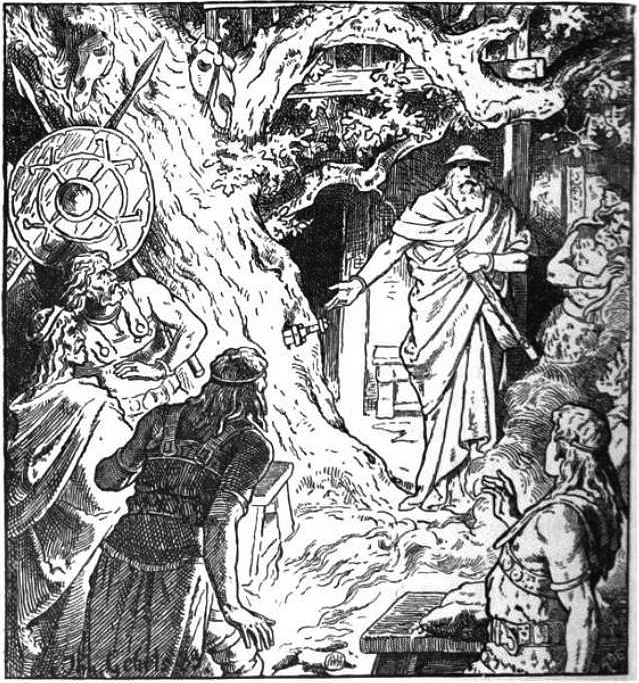
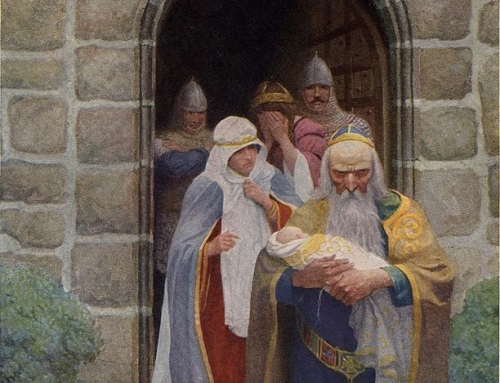
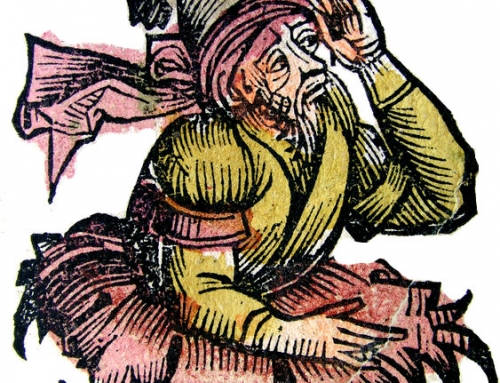

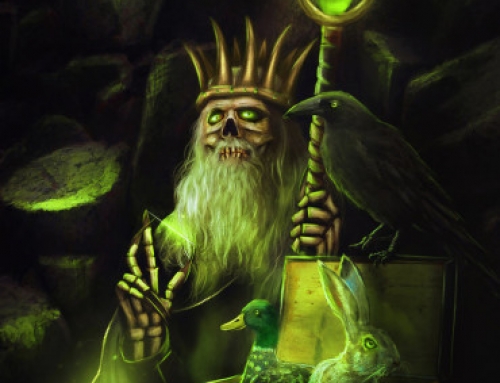
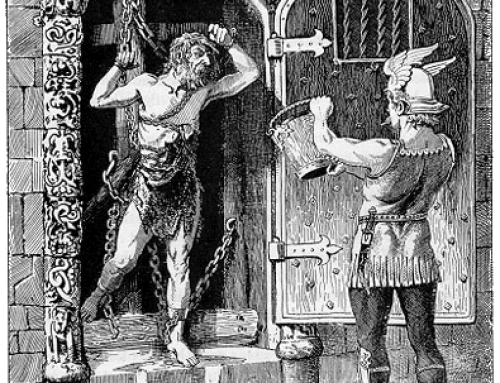
Really enjoying this podcasts, thank you!
Thank you for saying hi! Glad you like the show
I’ve just started listening and really enjoy this podcast so far! Where can I find the frozenbeard pictures? :)
http://www.mythpodcast.com/3a-volsungs-the-norse-and-the-furious-bredis-drift/ They are with the posting for the episode. Also, I’m really glad you like it!